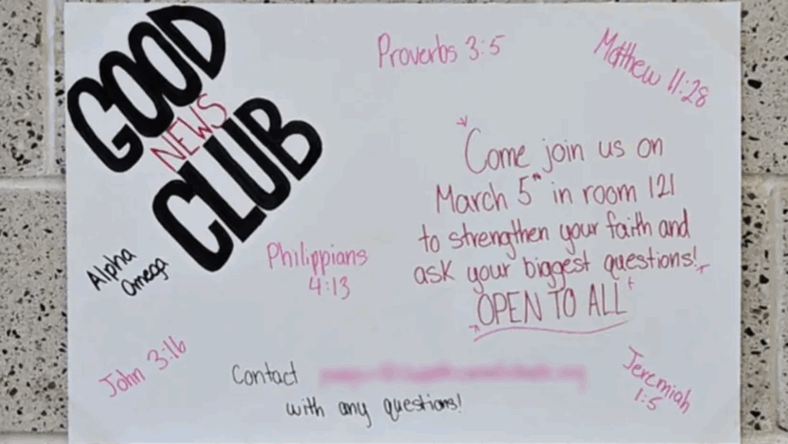
The Good News has been banned at Carmel High School in New York.
A ninth-grader named Jenna was given permission to start a Bible club on campus. She called it the Good News Club and put up posters around campus promoting the group.
But school leaders tore down the posters. They said there were too many Bible verses and they also had a problem with the name of the club – Good News Club.
The teenager was told to strip her posters of anything having to do with religion – and that included artwork.
When Jenna asked why, administrators told her the posters had “too many Bible verses” and insisted the club could not be called the “Good News Club.” She was forced to change the group’s name and strip her posters of any religious imagery, including a cross and even a single Scripture reference. In short, her posters were censored because they were Christian, and she had her religious messages removed. School officials went as far as insisting on reviewing her posters to determine whether they were too religious.
To make matters even worse, school administrators determined what religious materials the students could discuss during their club time.
The American Center for Law and Justice is now representing the young Christian girl.
“After persistent efforts to gain approval for her faith-based group, Jenna finally received permission to form her club. But her constitutional struggle was far from over. To kick off the Bible club, she created simple posters that announced the club’s upcoming meeting. The posters included a welcoming message, a handful of well-known Bible verses, a cross, and an invitation for all students – something Jenna herself feels strongly about – to attend and be encouraged by the words of Jesus. Still, school officials removed the posters from the hallways.”
According to federal courts – public schools cannot target or suppress religious expression.
Thirty-five years ago, at the U.S. Supreme Court in Board of Education v. Mergens, the ACLJ argued and won on behalf of students’ rights to have Bible clubs on public school campuses and defended the constitutionality of the EAA. The Supreme Court overwhelmingly affirmed that schools cannot discriminate against students conducting a meeting based on the “religious, political, philosophical, or other content of the speech at such meetings” under the EAA. The EAA further protects students from the influence of others on the content of voluntary, student-initiated meetings. It requires that religious clubs receive the same treatment as all other non-curricular student groups. Schools cannot single out religious groups for special restrictions or content censorship.
The ACLJ is demanding that the Carmel Central School District reverse its decision to ban the Good News Club.
ACLJ says they will not allow public school officials to silence Christian students.
And that’s great news!